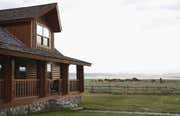You might decide to rent out your vacation home to offset the costs of ownership and to generate income (ideally a profit). There are several important considerations to make before deciding to rent out your vacation home. (See also: Top 10 Features of a Profitable Rental Property.)
Calendar Conflicts
Keep in mind that peak rental periods might be the same weeks you want to use the property – summer weeks for beachfront properties, winter weeks at ski resorts and the holiday season, no matter where the house is located. If you’re willing to use the property during off times, you’ll likely have a better chance of renting out your vacation home – plus you’ll be able to collect higher rental fees. In general, a weekly in-season rental costs about the same as a monthly off-season rental. For example, if your house rents for $5,000 a week at the beach in the summer, you might expect about $5,000 a month during the winter.
Property Management
You can market and rent the property on your own by listing it on vacation home websites like Airbnb.com, VRBO.com and HomeAway.com. In your listing, be sure to include an engaging (but accurate) description of the property, including details about its location and amenities, as well as photos, rental fees and cancellation policies. You can also advertise in target newspapers or magazines and other online portals.
Do-it-yourselfers may enjoy the savings of not involving a property management company and being able to take advantage of certain tax benefits. If you have an adjusted gross income of less than $150,000, for example, you can write off passive losses if you manage the property yourself (without an agent of property manager).
Still, taking care of the property on your own can come at a price. Many vacation properties are continually exposed to excessive wear and tear (think: bachelor party), and maintenance issues and repairs are ongoing. Making the repairs or even arranging service calls can be frustrating and time consuming.
Many owners solicit the expertise of a qualified property management company to handle the rentals. The company takes care of the marketing, renter interactions, collection of rental fees and all other aspects of the rental process. In addition, the company generally provides routine maintenance services and can arrange for repairs. For these services, you’ll pay a fee plus a commission on rental fees, depending on the extent of the management services provided – but it can well be worth the price.
14-Day or 10% Rule (IRS)
Tax laws offer some tax breaks that may help make vacation-home ownership more affordable. Firstly, if you use the vacation home solely for your own personal enjoyment (and it’s not rented out at any time during the year), you can typically deduct real estate taxes and home mortgage interest. Like a primary residence, you can’t write off any of the costs associated with utilities, upkeep or insurance.
The tax benefits an owner may be entitled to depend on how long the property is rented out each year and how much time you spend in the home. You’ll fall into one of three categories:
- You rent out the property for 14 days or less. You can rent out your vacation property to another party for up to two weeks (14 nights) each year without having to report that income to the IRS. The house is still considered a personal residence, so you can deduct mortgage interest and property taxes under the standard second-home rules.
- You rent out the property for 15 days or more, and use it for fewer than 14 days or 10% of days the home was rented. This property is considered a rental property, and the rental activities are viewed as a business. If you rent out your property for more than 14 days, you must report all rental income to the IRS. You can deduct rental expenses (including mortgage interest, property taxes, insurance premiums, fees paid to property managers, utilities and 50% of depreciation), but you must factor in the amount of time the property is used for personal versus rental use.
- You use the property for more than 14 days or 10% of the total days the home was rented. If you use the property for more than 14 days or more than 10% of the total number of days it’s rented in a year (whichever is greater), the property is considered a personal residence and you can’t deduct any rental losses.
If your vacation home is considered a rental property (you limit your personal use to 14 days or 10%), up to $25,000 in losses may be deductible each year. Incidentally, fix-up days don't count as personal use, so you can spend more days at the property as long as it’s for maintenance purposes (keep records and receipts to prove why you were there). (For related reading, see: Tax Breaks for Second-Home Owners.)
The tax implications of vacation home ownership are complicated. It’s recommended that owners and potential buyers consult with a qualified tax accountant to gain a full understanding of the tax implications and laws, and to determine the most favorable tax handling. (See also: Tax Rules for Renting Out Your Vacation Home.)
Rental Income
If you decide to rent out your property or place it on a rental program, you’ll have to set rental rates that maximize the number of renters and generate good cash flow. If your rates are too high, the property won’t be rented out as often – but if your rates are too low, it will be difficult to make any money. To ensure you’re setting good rental rates, take the following factors into consideration:
- Competitors' Rates. How much are similar properties in the area renting for?
- Expenses. How much will it cost to rent the property? Consider cleaning fees, insurance, management fees, utilities, pool cleaning, marketing, maintenance, renovations and the like.
- Time. How much time will you dedicate to renting out and maintaining the property?
Vacation Property Walkthrough: Selling a Vacation Property
-
 Taxes
TaxesTax Breaks for Second-Home Owners
Owning a second home is a great investment for a variety of reasons, but you need to know the tax implications of multi-home ownership. -
 Investing
InvestingInvesting in Rental Property: What to Consider
Investing in rental property has some unique issues which need to be considered. -
 Financial Advisor
Financial AdvisorHow to Reduce Real Estate Investment Taxes
Real estate tax law is not the same for rental properties as it is for residences. These tips can help you pay less in taxes. -
 Investing
InvestingIncluding Rental Real Estate in Your Portfolio
Why you should consider adding rental properties to your retirement investment portfolio. -
 Investing
InvestingIs It Worth Buying a Second Home to Rent?
Consider these dos and don'ts before making the leap into rental property ownership. -
 Investing
Investing5 Ways Rental Properties Jumpstart Your Finances
Rental properties can help pay your mortgage, provide tax benefits and create retirement income. -
 Investing
InvestingVacation Home or Income-Producing Investment?
Rather than let your vacation home sit empty, you can rent it out and make a profit. But you'll need to consider the tax implications. -
 Taxes
TaxesHow to Prevent a Tax Hit When Selling a Rental Property
Rental property ownership has its benefits, but when selling you can face a big tax hit. Thankfully, there are ways to reduce your capital gains exposure. -
 Investing
InvestingTips for prospective landlords
Investing in rental property can generate serious income, but there's more to it than collecting rent. Check out all the pros and cons before you invest in the rental property. -
 Investing
Investing8 Must-Have Numbers For Evaluating A Real Estate Investment
These calculations can help you figure out if a particular property will be a valuable investment.



